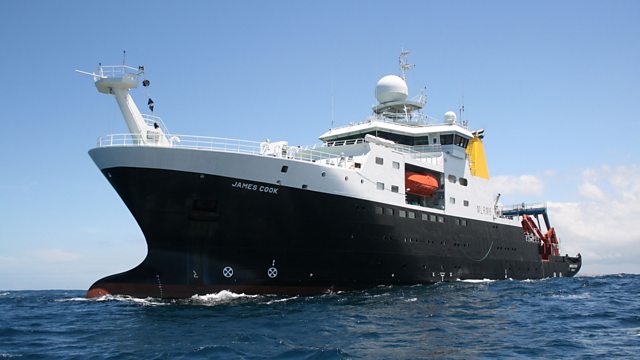
Atlantic Seabed Drilling
The Royal Research Ship James Cook, will be sailing off at 9.30 am on Monday carrying several teams of scientists and 100 tonnes of equipment.
Atlantic seabed drilling
The Royal Research Ship James Cook, will be sailing off at 9.30 am on Monday carrying several teams of scientists and 100 tonnes of equipment. The vessel is sailing to the middle of the Atlantic Ocean, just above the Atlantis Massif, to recover rock specimens using state-of-the-art drilling technology. Scientists hope to gain insights into microbial life, chemistry, and geochemistry found there from analysing the rocks.
ExoMars landing site settled
This week the European Space Agency put forward the most likely landing spot for its ExoMars rover. The mission will be searching for hints of the sorts of life the RSS James Cook will be exploring for on earth. And another mission to the moon is also announced, delving into a deep crater on the dark side.
Readability of IPCC Report
A paper in Nature Climate change last week scored the IPCC Summary for Policy Makers report, very low for 'readability', Adam Rutherford discusses the trade-off between writing science that is right, and writing science that is understandable.
BF Skinner
Claudia Hammond explores the legacy of BF Skinner and Behaviourism. One of the most famous psychologists of the 20th century, he became one of the most controversial, by applying the theory he developed through animal studies to human learning.
Claudia is shown round his study by his daughter, Julie Vargas. Remaining much as it was when he died in 1990, it reveals another side to the man famous for his operant conditioning experiments with rats and pigeons, and infamous for his template for what some have described as a totalitarian state, in his book 'Beyond Freedom and Dignity'.
Claudia also meets his younger daughter, Deborah Buzan, and explodes the myth that she was raised in one of Skinner's experimental 'boxes'.
She hears more about the man and his work from Richard McNally at Harvard, and Gordon Bower and Lee Ross of Stanford University.
Bees and diesel
The polluting power of diesel has been getting a lot of press recently. Now, new research has shown that the volatile nitrogen oxides in diesel exhaust (NOx) are preventing bees from finding their food flowers. The diesel chemically alters some of the most common floral scent compounds, rendering them unrecognisable to bees and other insect pollinators. The effect adds to the suite of environmental factors impacting bee survival.
Howler monkeys
The deep, growling roar of the howler monkey may hide reproductive shortcomings, according to biologists. A study by an international team of scientists has revealed that the primates either develop big voices, or big testes - but not both. Scientists made the discovery while trying to understand the "evolution of the animals' incredible roars". The findings suggest such evolutionary trade-offs may be more common than previously thought.
RRS James Cook 漏 National Oceanography Centre
Last on
More episodes
Previous
Broadcasts
- Sat 24 Oct 2015 21:06GMT大象传媒 World Service
- Sun 25 Oct 2015 11:06GMT大象传媒 World Service
- Mon 26 Oct 2015 06:06GMT大象传媒 World Service South Asia
Podcast
-
![]()
Unexpected Elements
The news you know, the science you don't

